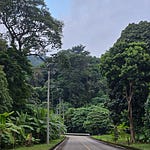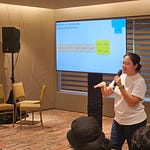Hello friends!
This time I decided to record an audio version of this newsletter in the form of a conversation with my friend Colin. He has supported me since we started Deep Work and is currently our treasury manager. I still need to improve my voice and audio, but I’m excited to share the first version with you.
Below, I will briefly summarise my insights from my conversations at EthCC and share a few policy changes at Deep Work, as we increase clarity of our value proposition. I also suggest stopping offering branding based on our current process, with the reasons outlined below.
Thank you to all the wonderful people who said hi in Brussels, it was really lovely to see you!
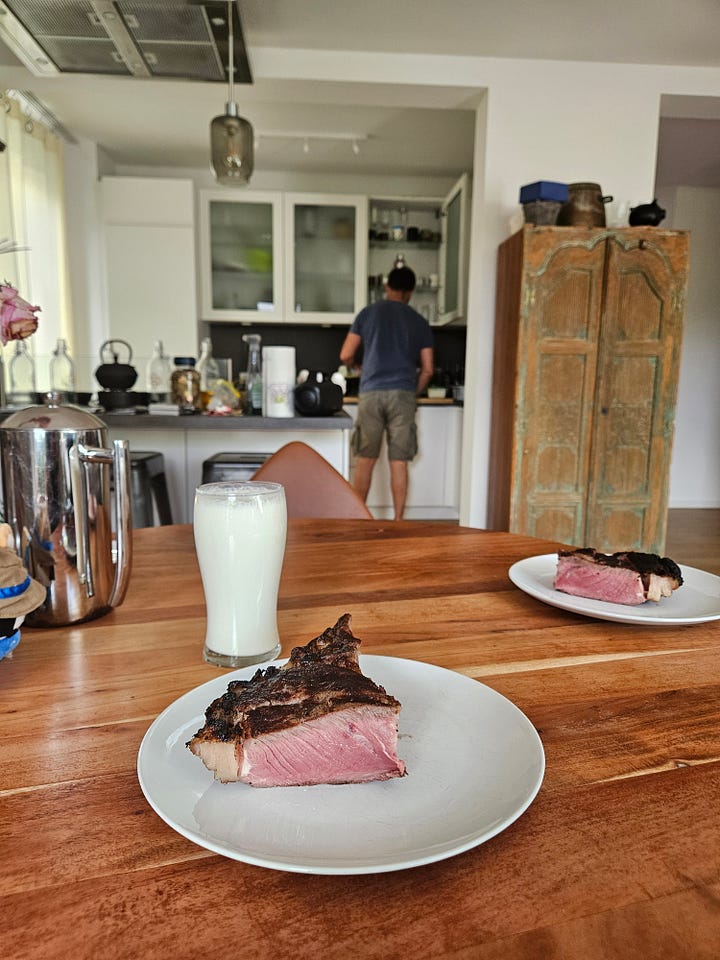
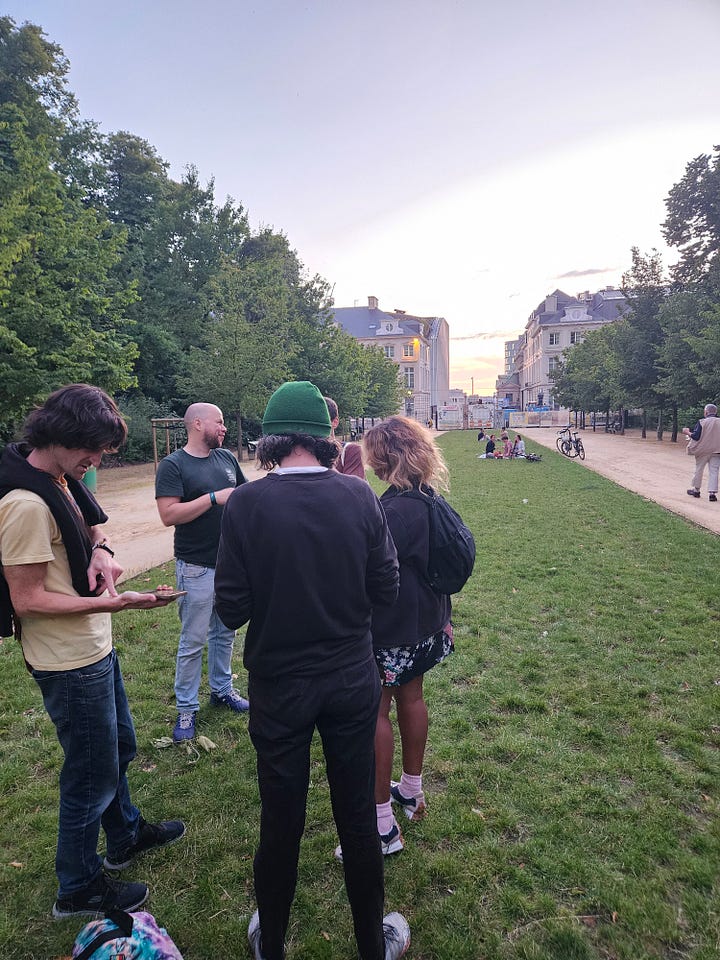
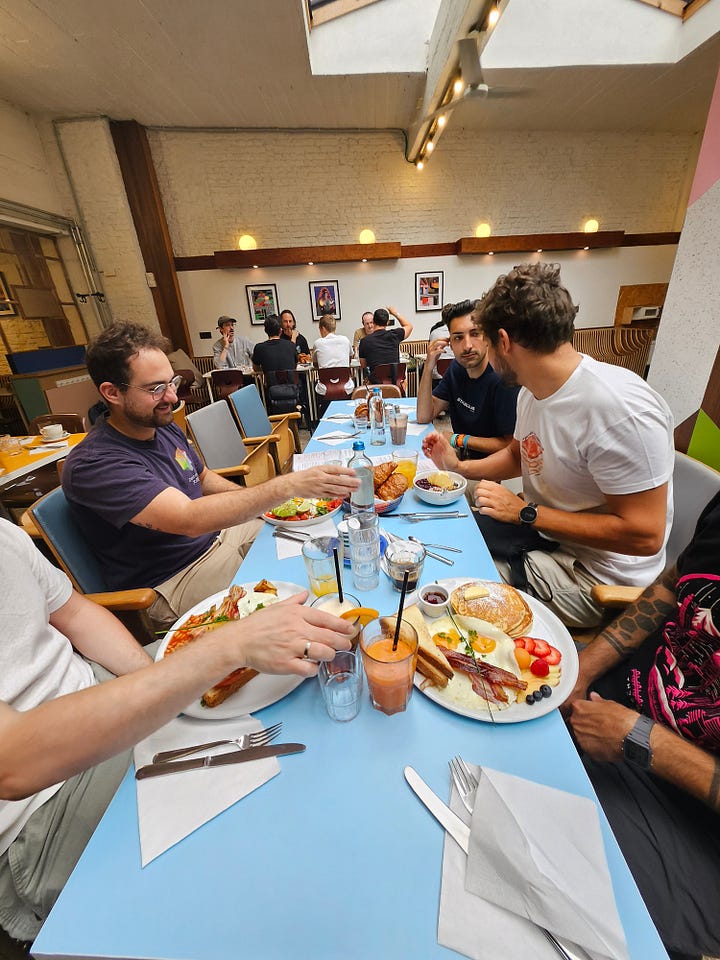

Current activity
Justina is calling for Deep Experiences in Bangkok! Share your availability and join us in the planning session.
Balint has started work on two product design projects and Anya is working on a small brand and pitch deck design. The website project for MetaCamp however has been cancelled by the client team.
Rory has hammered out an impressive article on the intersection of EigenLayer and “the future of work“.
And I’m still deep in the business development rabbit hole, refining our most valuable offering to match clients’ needs.
Investors and DAO ecosystems can benefit from Deep Work the most
After interviewing a lot of VCs, several representatives of DAO ecosystems, and other individuals in the position of distributing capital among innovative teams, it’s unambiguous that they share the same problems. Technical teams don’t have business management skills and consequently, waste most of the money they receive. Investors don’t have the time to be in the founder role but have to satisfy their LPs. And DAO ecosystems want to maintain quality control while measuring the impact of their “sub-DAOs“.
I also recently realized that in the 7 years of Deep Work being around, we built a cohesive and value-driven community, two products (one of which is in active use), and a recognizable brand.
This is more than the majority of VC-backed startups in web3 (which received $5-10m USD in funding and collapsed) at about 5-10% of the cost and with no external investment.
In my opinion, that means that the opportunity space for our expertise is huge.
The “network state concept” is still very early
During EthCC I also kept my eyes open for people and teams working towards decentralization of living spaces. My general observation is that the interest in the topic increases and many off-grid projects or regenerative farms receive attention. But aside from people pulling out weeds or locally innovating on hydroponics (which has been around for many years), there’s not much evidence for successful coordination of humans.
I assume that the urgency to innovate and improve coordination will emerge as a consequence of increased geopolitical conflicts and people leaving countries to avoid physical harm.
We thought we were in the “design business”, but we are more likely in the “coordination-of-labor business”
Upon reviewing previous client feedback, Deep Work’s strengths lie in aligning multi-stakeholder teams and providing web3-native expertise in product design, user research, business management, and HR. Our workshops reduce the time and cost of coordination to a minimum, which especially in DAOs is a huge problem.
These problems are generally very different from what design agencies work on, so we can’t compete with them. The good news is, we can now look more specifically for teams struggling with PMF and additionally experience coordination challenges, unique to web3. As we understand more about how they experience their pains, we can tailor and customize our offering more precisely.
For context, as far as I know, our happiest customers for design work shared these traits:
Well-funded (Seed / Series A) and had a budget for design work.
Multi-stakeholder teams that needed to be aligned.
Struggle with finding product market fit.
Knew they needed to fix it and were motivated to spend money on a high-quality UX.
Wanted to move fast to focus their time on their skills (as opposed to riding the bull market wave).
Web3 native and happy to avoid useless paperwork.
Project Managers need to gather client feedback
Thanks to everyone who had a read through the new Project Manager workflow, I have now updated the documentation in Deep Teams. There are a few detailed clarifications, most related to appropriate setup, payment management, and record of work in Deep Teams.
As the business manager, I will pay closer attention to adequate execution of the workflow because it is one of the most important roles to the longevity of our business.
Most importantly, please ask the client for feedback upon completing the project. This information will give us very clear data on how we can improve our services and avoid losing touch with the market (again).
I am currently testing a lightweight (and scalable) approach to selling our services
As I mentioned in a previous newsletter, it seems reasonable to offer short and low-cost alignment workshops as a way of introducing further work with Deep Work, if needed. It’s also similar to a smooth onboarding into a product.
It should fulfill the following criteria:
Not take longer than 1-2 hours
Align the team (and potential stakeholders) on what they really need
Help them recognize their gaps
Provide expert advice on fixing the gaps
Give us enough information to understand what they need and create a bespoke proposal
The exact exercises will depend on the individual expertise. We have done them with mission/vision/audiences, with a user journey, with organizational mapping, and more.
Branding was never our expertise and most clients asked for it at the wrong stage of growth
Almost every branding project incurred some inconvenience and had some degree of instability. I also don’t remember it ever being enjoyable for our team (correct me if I’m wrong). This had many different reasons but most importantly, I think most customers wanted mainly a website and didn’t know that they actually needed to align on a mission and values.
So they asked for one thing (branding), and wanted something different (website and marketing material), and really needed another thing (mission alignment), but received only a part of everything. So it makes sense why they often considered us expensive or incomplete, we weren’t solving their exact problem.
A “brand“ emerges from a specific feeling a loyal customer base associates with the product. Most teams didn’t have a lot of loyal customers before working with us.
This is not to say that we did it wrong. We have never actively promoted our strengths in brand design, and consciously accepted most projects for the money, even declining some. And I just don’t think we need to do that anymore, especially if we focus on products and organizations.
Recommended reading
Generous acts have contrasting meanings in equal versus hierarchical social relationships by Chen, Alicia M., and Rebecca Saxe.
Ever wondered why it sometimes “feels right“ to buy someone a coffee? This very recent paper examines the relationship between acts of generosity and social status.
The authors conclude that in most cases, repeated acts of generosity (e.g. when one person always buys another person a coffee) reinforce the existence of a social hierarchy between two people, and it doesn’t matter if the giver or receiver is higher in status.
Alternating acts of generosity (like when both people alternate buying each other a coffee) establish more equality in the relationship and are often deliberately used to communicate equality (or a change in the hierarchy).
Please let me know if you have suggestions for improvement or ideas for the “podcast”.
Have a nice week and see you soon!
Andrej







